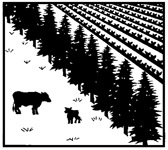United States Department of Agriculture, Forest Service, National Agroforestry Center

Agroforestry Notes (USDA-NAC)
Date of this Version
April 2000
Document Type
Newsletter Issue
Citation
National Agroforestry Center, United States Department of Agriculture, Forest Service, Rocky Mountain Station, United States Department of Agriculture, Natural Resources Conservation Service, Lincoln, Nebraska
Abstract
Hybrid poplars are rapidly growing trees that are well suited to use agricultural, industrial, and community wastewater. They are being used as an alternative to expensive wastewater treatment systems, and methods which apply wastewater to annual crops or pasture. The trees serve a dual purpose as a nutrient sink for wastewater use and as a means to produce a short-rotation harvested wood product which helps offset the cost of installation and maintenance.
Planning tree wastewater use systems requires both agroforestry and engineering expertise. Omission of either in the planning process can lead to disappointing results and reduced benefits. This Agroforestry Note outlines and discusses the major planning and engineering considerations for a short rotation woody crop (SRWC) wastewater application system.


Comments
United States government work